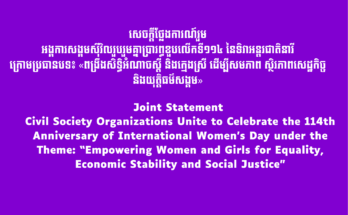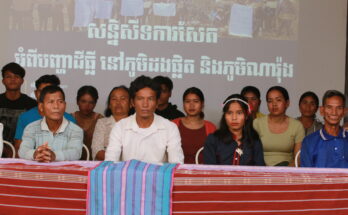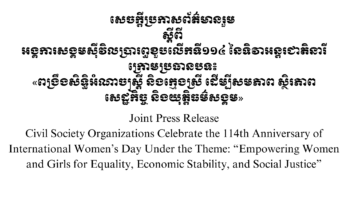The following organizations sent a joint open letter to Cambodia’s donors, which will participate in the Government-Development Partners Coordination Committee (GDCC) meeting on 26 September 2012 in Phnom Penh:
1. Asian Forum for Human Rights and Development (FORUM-ASIA); 2. Civil Rights Defenders; 3. Dignity International; 4. Freedom House; 5. Global Witness; 6. Human Rights Now; 7. Human Rights Watch; 8. The Observatory for the Protection of Human Rights Defenders – a joint programme of the International Federation for Human Rights (FIDH) and the World Organisation Against Torture (OMCT).
JOINT OPEN LETTER
The past month has seen another serious downturn in Cambodia’s human rights situation. We wish to highlight here the three most recent and prominent cases. The first concerns the current detention and trial of Mam Sonando, the director and owner of independent radio station FM 105 (Beehive Radio). Sonando has been an outspoken advocate against human rights abuses, including those associated with the rapid sell off of Cambodia’s land and forests to investors. He was arrested twice in the past on spurious grounds after publicizing human rights violations over Beehive Radio.
The grounds for his most recent arrest are extremely dubious. He is alleged to have played a leading role in what the government has labeled a “secessionist” movement in Kratie province, an allegation referring to community organizing in opposition to land-grabbing. Sonando’s arrest also followed his reporting over Beehive Radio of a complaint lodged at the International Criminal Court arguing that land-grabbing in Cambodia amounts to a crime against humanity. A public call for his arrest was then issued by Prime Minister Hun Sen in a nationwide televised speech. Despite this threat, Sonando voluntarily returned to Phnom Penh on July 12 and was indeed arrested and detained. No credible evidence has been presented to substantiate the allegations against him. Despite assurances from the Prime Minister to the contrary, we are concerned that proceedings against Sonando may lead to the silencing of Beehive Radio, a crucial source for independent news and commentary in Cambodia as the country prepares for national elections in 2013.
Sonando, 70, has also repeatedly been denied bail and his health is reported to be deteriorating in detention. The verdict on Sonando’s case is reportedly due on October 1 (after the GDCC meeting). If found guilty, he could face up to 30 years in prison.
The other cases concern two women human rights defenders, prominent land housing rights activists Yorm Bopha and Tim Sakmony, who were arrested on September 4 and 5, respectively, similarly on the basis of questionable allegations.
Yorm Bopha, a pivotal figure in the protests against forced evictions in the Boeung Kak area of Phnom Penh, was detained for allegedly assaulting a person suspected of theft. We believe the evidence for this is at best distorted and may be fabricated.
Tim Sakmony, a leader in protests against forced evictions from the Borei Keila area of the capital, was arrested after the owner of land developer Phanimex lodged a complaint alleging that she had made a “false declaration” in a suit accusing Phanimex of inadequate compensation for persons evicted from land the company is developing. Phaminex was originally granted land in Borei Keila conditional upon the construction of ten apartment buildings to rehouse residents, but only built eight. Sakmony is currently being held in pre-trial detention at Prey Sar prison, pending judicial investigation under Article 633 of the Cambodian Penal Code, which prohibits making a “false declaration to a public body for the purpose of obtaining an allowance, a payment or any unlawful advantage.”
We are concerned that the legal actions being carried out against Bopha and Sakmony are in fact motivated by their involvement in land-related advocacy campaigns on behalf of the Boeung Kak and Borei Keila communities. Their pre-trial detention is contrary to the International Covenant on Civil and Political Rights, to which Cambodia is a party, which provides in article 9(3) that detaining persons prior to trial should not be the general rule. The UN Human Rights Committee has noted that pre-trial detention should be exceptional and only under specific circumstances not applicable here. It is indicative of a broader government practice of using the law and judiciary to silence and punish human rights defenders, social activists and community organizers in Cambodia.
We strongly urge donors not to endorse and reward the actions of the RGC through a large-scale injection of new funds, but instead to make a coordinated and public condemnation of the government’s increasing human rights abuses. Further international aid should ensure that that democracy, the rule of law and human rights in Cambodia are strengthened. As it stands, these are all demonstrably compromised. It must also be based on the achievement of concrete reforms in natural resource governance, in particular in the land sector, including the enforcement of the moratorium on Economic Land Concessions announced by RGC on 7th May 2012. Ensuring just outcomes for the Sonando, Bopha and Sakmony trials is a start, and will set an important precedent for future cases and, more generally, the protection of human rights in the country.
Financial commitments made to the RGC should take into account the rights and freedoms of all Cambodians, or they risk sending an implicit message of approval of the RGC’s actions. We respectfully request the international donor community to take a path that reminds RGC of its international obligations.
Thank you.
Sincerely yours,
1. Asian Forum for Human Rights and Development (FORUM-ASIA)
2. Civil Rights Defenders
3. Dignity International
4. Freedom House
5. Global Witness
6. Human Rights Now
7. Human Rights Watch
8. The Observatory for the Protection of Human Rights Defenders – a joint programme of the International Federation for Human Rights (FIDH) and the World Organisation Against Torture (OMCT)



